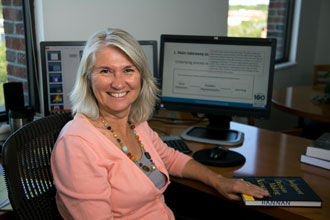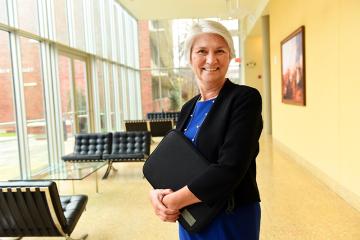Hannan appointed editor of leading accounting journal
Professor of Accounting R. Lynn Hannan has been named to a three-year term as an editor of Contemporary Accounting Research.

The appointment, which began May 1, is a prestigious one. Published since 1984 by the Canadian Academic Accounting Association, CAR is recognized as one of the top five journals in accounting and one of the top 50 in business.
“It’s a great honor to serve as an editor of Contemporary Accounting Research,” says Hannan. “It’s truly one of the leading scholarly publications in the field, and I’m very excited to become a senior member of the editorial team.”
With more than a dozen articles in peer-reviewed journals to her credit, Hannan is one of the nation’s leading scholars in the area of managerial accounting that deals with the social and psychological drivers of decision making. Her research explores the intersection of accounting, management and psychology, focusing on how organizations can improve outcomes via the design of their accounting information and incentive systems.
Hannan joined the Freeman School in 2013 from Georgia State University, where she served as a professor of accounting and director of the accounting PhD program. Prior to beginning her academic career, she worked as an auditor for the state of Pennsylvania and later as a tax manager for Westinghouse Electric Corp. While managing the tax implications of a $6 billion accounting charge at Westinghouse’s financial services division, a loss that almost bankrupted the company, Hannan realized the important role that accounting plays in influencing managers’ decisions. The experience helped spark her interest in the relationship between accounting information and incentive systems.
“Accounting information helps you make the right decision, but it also influences those decisions,” she says. “How you’re evaluated, for example, can skew the way you process accounting information, perhaps leading you to focus more on short-term results. What I’m interested in is how we can improve accounting to help people make better decisions, in terms of both quality of information and the motivational factor.”
A recent paper by Hannan on framing in incentive contracts explores the issue of motivation. Through a series of experiments, Hannan found that penalty clauses are a greater performance motivator than bonuses, but the effect is moderated by the employee’s perception of the penalty. To the extent that the employee feels the penalty is unfair, he or she is less motivated by it.
Hannan says this type of research — applying insights from cognitive and social psychology to traditional agency theory— is relatively new in accounting.
"Historically, this area of research was based almost exclusively on the utility function — people are motivated by wealth and leisure, so if you want to get someone to do something, you have to pay them," Hannan says. “What my research does is expand the utility function to include what I call social preferences. In the real world, people don’t just care about money. They also care about things like fairness and their reputations and how they compare to peers. So given these social preferences and cognitive limitations, how can we then present our accounting information in the best way and design contracts in the best way? That's really my focus.”
Hannan also serves as a director of the Institute of Management Accountants Research Foundation, an international organization of accounting and financial professionals working in business, so she hopes that that role together with her appointment at Contemporary Accounting Research will help to promote accounting education and scholarship at the Freeman School.
“The energy here right now is just amazing,” she says. “Everyone in the accounting area is very collegial, very high-energy. Just really good people. I’m excited to do anything I can to help spread the word.”
